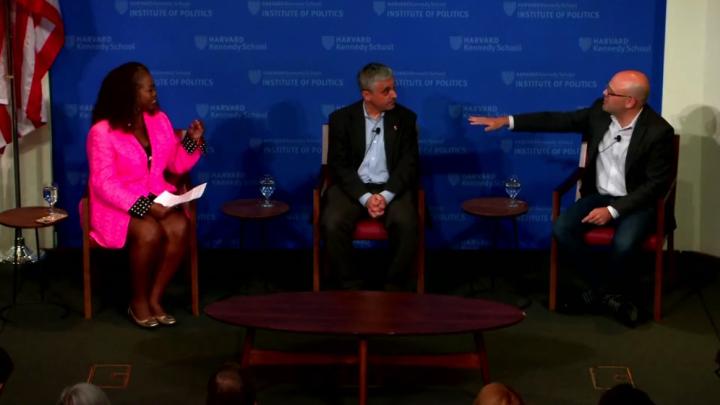“Ten years from now, there could be crises that make 2020 look like a garden party,” said Rockefeller professor of Latin American studies and professor of government Steven Levitsky last night. “There could be a fair amount of violence. There could be a stolen election. There may be brief periods of undemocratic rule. I think we’re heading for a period of intense conflict.”
Such was the tone of the forum on global democracy with coauthors of How Democracies Die (2018), Levitsky and Eaton professor of the science of government Daniel Ziblatt. The panel was moderated by Institute of Politics (IOP) senior advisory committee member LaTosha Brown and cosponsored by IOP and the Ash Center for Democratic Governance and Innovation. The speakers noted a rise in fascist tendencies in the United States and around the world and suggested ways to combat it.
The talk coincided with Giorgia Meloni’s election this week as Italy’s new prime minister. Meloni is a member of the Brothers of Italy coalition (FdI), a far-right political party descended from neofascists. (Meloni has said she and her party disavow fascism.) Her election raised alarm bells for Ziblatt and Levitsky, particularly in the context of the rest of Europe. Marine Le Pen—whom moderator Brown described as a fascist—won about 42 percent of the vote in France earlier this year. Of Italy, Ziblatt said, “This is the first time that a party with roots in the fascist era is running a government….This is a major threat. It’s to be taken seriously.”
“There are reasons why these parties are successful: disaffection with politics, disaffection with the economy, a sense that the world is not improving, a general sense of malaise,” he said. “But I think the other important part of the story is how mainstream politicians respond to them. Do they overlook their own internal differences to realize there’s a threat out there?...I think one of the lessons here is that it’s necessary to have a broad coalition against these kinds of parties, but it’s difficult to form them.” He said in Italy and elsewhere, “The challenge of building a multiracial democracy has turned out to be a hell of a lot harder than we anticipated.”
Fascism is also brewing in the United States, according to the speakers. Democracies must follow two “norms” to function: legitimacy and forbearance. Political parties must accept the legitimacy of the other, and they should not abuse political tools to get power. “We’re at a point where a major political party in the United States is abandoning, not just norms—it’s abandoning democracy,” said Levitsky of far-right Republican party members. Ziblatt added, “I think it’s a mistake that you have to tolerate that and just say, ‘Well, okay, they’re the other side.’…You can’t just have an open mind toward the other side. I think taking a strong stand against the other side is necessary.” (No conservative or Republican speakers were on the panel.)
“The Republican Party is representative of a Christian majority in decline that feels like the country it grew up in has been taken away. It’s a constituency that is reacting against multiracial democracy,” said Levitsky. The duo defined multiracial democracy as a system in which all adults can vote and all ethnic groups have equal civil rights. Levitsky added, “There is an imminent, authoritarian threat in this country, and we need to build a very broad coalition to defend what we have, and then finish this transition to multiracial democracy.”
“We need a set of institutional forms that allow majorities to govern,” he added—namely, making it easier for people to vote, and abolishing or reforming the Electoral College. He said, “Ideally, we also need a more democratic Senate. We’re never going to empower minorities while Wyoming has the same representation in the Senate as California and New York.” Ziblatt also advocated for abandoning the Senate filibuster and cloture rule (which requires 60 members to end debate on topics and move to a vote). The rules are intended to encourage bipartisanship and compromise, but “We don’t really have a lot of bipartisanship and compromise, and we have this rule.” He said overall, “If you want to talk about getting us closer to democracy, we need a set of institutions that actually permit majority rule.”
Defeating fascist-leaning forces in the United States will take pro-democratic forces on the right and left. “We need a coalition that expands beyond blue states to win. And the sooner we win and defeat them politically, the sooner we’ll be able to begin to talk about rebuilding our democracy,” Levitsky said. He said America is headed for “a generation of pretty nasty politics” where it will be “sliding in and out of crisis,” but in the long run, he’s heartened by young people and the shift in public opinion: “I think we’re going to get there. It’s just going to take a little while.”









